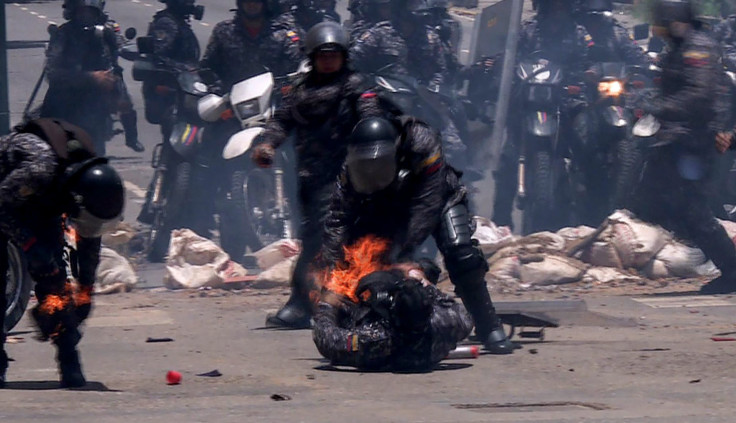Venezuela Election Step Toward Dictatorship, US Warns Amid Protests That Killed Several

“I said rain, thunder or lightning, the 30th of July was going to come,” Venezuelan President Nicolás Maduro said as he cast his ballot in the election Sunday for a new constituent assembly.
Maduro, who hailed the election as the "biggest ever vote for the revolution,” promised it would bring peace and stability to the country where more than a hundred people have died in the protests this year, reports said. He was the first person to cast vote shortly after the polls opened at 6 a.m. EDT Sunday. “The first vote for peace,” the Venezuelan president said after casting his ballot.
Read: Venezuela Crisis 2017: Security Forces, Demonstrators Clash Amid Recession-Induced Shortages
"The Constituent Assembly will be the space, the power of powers, the superpower that will, so to speak, recover the national spirit, find reconciliation, justice, find the truth," he said as he accused President Donald Trump of trying to “prevent the people from carrying out its right to vote,” CNN reported.
Maduro's move was criticized by many, especially by the United States and Canada. Nikki Haley, the United States Ambassador to the United Nations, took to Twitter to slam Maduro’s election, calling it a step toward dictatorship.
Maduro’s sham election is another step toward dictatorship. We won't accept an illegit govt. The Venezuelan ppl & democracy will prevail.
— Archive: Ambassador Nikki Haley (@AmbNikkiHaley) July 30, 2017
Sen. John McCain (R-Arizona) too expressed displeasure over the election process and said he stood by the people of Venezuela who deserved democracy.
We stand with the people of #Venezuela today, who deserve democracy — not sham elections and Maduro’s repression https://t.co/JXA9PfVWlT
— John McCain (@SenJohnMcCain) July 30, 2017
The Canadian government also denounced Maduro’s decision. In a statement released Sunday, Minister of Foreign Affairs Chrystia Freeland said: “Canada denounces and condemns today’s significant and undemocratic action by the Venezuelan regime. This constituent assembly will further escalate tensions in the country by robbing the Venezuelan people of their fundamental democratic rights.”
“Despite repeated calls by member states of the Organization of the American States and the international community, including Canada, to cancel the national constituent assembly, President Maduro and his government chose to take another step down the path to institutionalize authoritarian rule in Venezuela. Individuals who are undermining democracy and human rights in Venezuela should be held accountable for their actions,” the statement read.
The people of Venezuela voted to create the National Constituent Assembly consisting of delegates who would rewrite the country’s constitution. The new committee will hold special powers that will give them the authority to even dissolve the National Assembly.
Read: Venezuela Inflation Crisis 2017: Country Only Has $10 Billion Left In Its Foreign Reserve
According to a BBC report, several people were killed after anti-government protesters took to the streets in the morning on the polling day, and clashed with police forces while the voting was underway. Around 380,000 troops guarded the voting centers as people stepped out to cast their votes. In the capital city of Caracas, security forces used armored vehicles to keep protesters in control, the report added, citing sources.
Elio Herrera, a resident of Caracas, called the election "democratic and popular," adding "it was a quick and simple process." The election commission said the voter turnout was 41.5 percent. Over eight million people cast their votes, commission president Tibisay Lucena said in a press conference late Sunday.
Despite the violence, Lucena said the election was a “success” and the voter turnout was “extraordinary.”
© Copyright IBTimes 2025. All rights reserved.





















